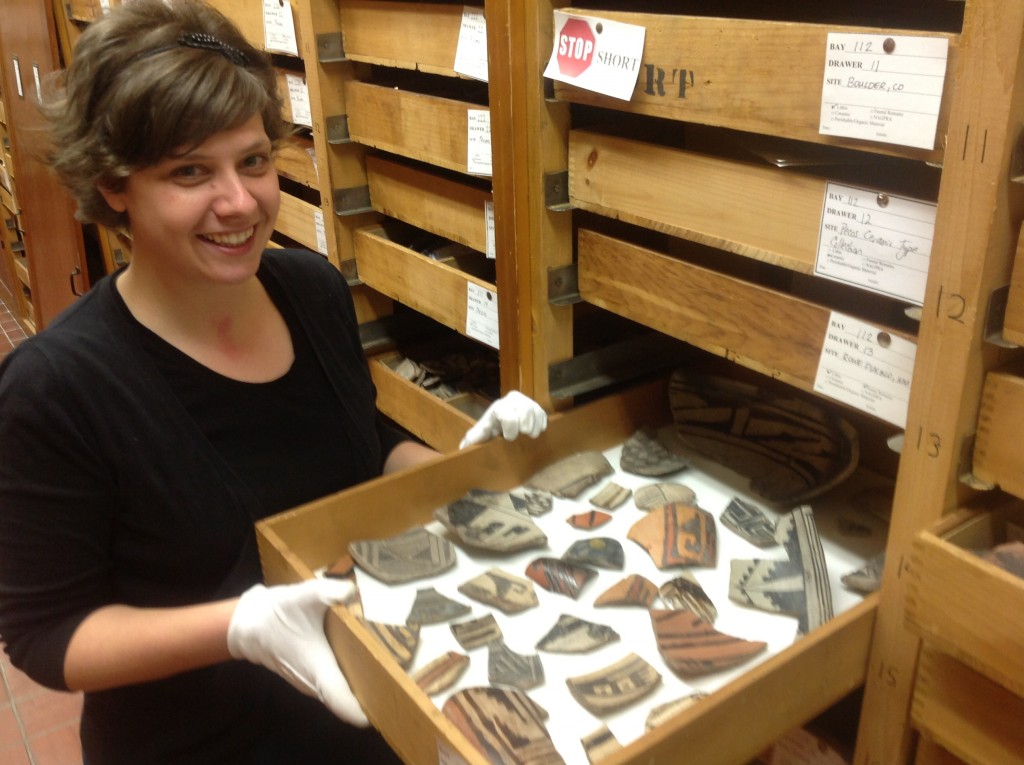Lindsay Randall, graduated from UMB in 2009
Curator of Education and Outreach at the Robert S. Peabody Museum of Archaeology, Andover, MA
For more about the Alumni Profile series, look at the inaugural post here.

Lindsay with collections from Pecos, New Mexico, excavated by Alfred Kidder and curated at the Peabody Museum in Andover.
What is your position now; what do you do on a day-to-day basis?
Given that in my undergraduate career I was a History major with a focus on secondary education, many of my cohorts joked that I wasn’t a Historical Archaeologist, but an Archaeological Historian. This combined with my ever present interest in education ensured that I would not follow the typical career path of someone with a Masters in archaeology.
I am currently the Curator of Education and Outreach at the Robert S. Peabody Museum of Archaeology at Phillips Academy (PA) in Andover, MA. PA is a boarding high school and the only high school in the United States to have an archaeology museum on its campus.
My main responsibility is to come up with creative and innovative ways to integrate archaeology education into classrooms through hands-on learning in a meaningful and realistic manner. Given the multidisciplinary nature of archaeology, I work with a variety of departments such as art, biology, English, foreign languages, history, music, and physics. I also co-teach a term long class, Race and Identity in Indian Country.
Our strategy is to not teach archaeology, but instead to teach WITH archaeology. Since we have important collections from sites such as Boylston Street Fish Weir, Etowah, Pecos Pueblo, and the Tehuacan valley, we are adamant that our students are given the opportunity to handle and work with these objects (with proper handling procedures beforehand!). We believe that it is important to instill appreciation and respect for stewardship in our students and that trusting them with such objects is vital to accomplishing this.
What is the most interesting project (field, lab, academic, or community) that you have worked on recently?
One of my favorite aspects of my job is how varied my responsibilities are. While working with the PA community is a significant part of what I do, it is also important to the school’s mission that I work with the broader community.
Recently I have partnered with Dr. Bethany Jay at Salem State University to offer a graduate level Summer Institute class, Preserving the Past: Using Archaeology to Teach History.
The class focuses on how archaeology can be used in middle and high school classrooms as a way to talk about minorities, who are often left out of the historical record. The class runs for five days and focuses on Native Americans, women, enslaved people, and free blacks, using local examples. During each day lesson plans are modeled for participants that focus on archaeology, yet utilize the resources available to all teachers.
One of my favorite lessons to come from this partnership is Little Spots Allow’d Them. It uses Dr. Alexandra Chan’s archaeological and landscape investigations at the Royall House and Slave Quarters to discuss how the concept of “otherness” was physically manifested in the landscape and the implications it has for us today. This type of activity forces students to think in a completely different way about the landscape and buildings they see every day. Plus I let them use lots of red string, which is always a win in teaching.

Students attaching yarn sight lines to model of the Royall mansion as a way to help them understand historical landscapes and uses.
What is one thing that you remember specifically about your time at UMass?
One of the main things that I remember from my time in the program is how close my cohort was and still is, really. I truly do not think I would have been as successful in the program without their help and support.
Our closeness however has not ended since our graduation. We still call upon each other to help with various projects – I recently worked with one person on archaeology activities to do with his daughter’s elementary class. And sometimes I get together with a grad school friend and hang out at the beach during a “staycation.” And it is always fun to catch up with someone at the SAAs or at another conference.
What is the best advice you got (or wish you had gotten) in graduate school?
The best advice I got was from Dave Landon when he told me that “Done is better than perfect.” This motto has really helped me keep things in perspective in both my professional and personal life.
